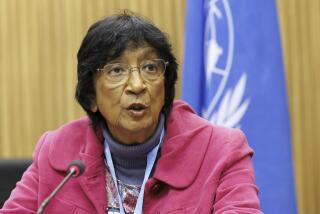Domestic violence: a global problem, not a religious one
- Share via
An Oct. 28 Times editorial hit the nail on the head by noting that the United Nations’ newly released report, “The World’s Women,” makes a disturbing point: Violence against women remains a stubborn problem around the world.
The reminder is timely. Voters in Oklahoma and Louisiana will decide Tuesday on ballot initiatives that would prevent Sharia law from entering the court systems; protecting women’s rights is cited as a reason, because Islamic law is believed to sanction such violence. It remains to be seen what voters will decide on Tuesday, but connecting violence against women to any religion sidesteps the real issue and primary causes of violence against women, allowing this pressing global health issue to escape the scrutiny and response it merits.
Violence against women cuts across nationalities, races and religions. The United Nations report provides a comprehensive study on girls and women; it underscores the connection between advancement and education, noting that women who go to school are more likely to lead successful and healthy lives to the benefit of society. Conversely, girls and women who are less educated or illiterate are more vulnerable.
Examples abound. In India several years ago, a woman sought the services of a social welfare organization in New Delhi because her husband was abusing her (one of the writers of this piece, Sheila B. Lalwani, handled her case). She knew her spouse was treating her wrongly, but she was also painfully aware that she had no money or support from her family. She came into the center to learn more about her legal rights and options. She was Hindu, and after counseling her, the caseworkers assisted Muslim and Sikh women who needed help. Few abused women actually pursue divorces; they often return to their husbands, and, in many cases, the women are beaten to death.
This example speaks to another reality: In many regions of the world, women are still expected to endure violence. This has more to do with culture and traditional values than religion. According to the United Nations report, women often find abuse justifiable. In one section of the report that looked at 33 countries, a sizable portion of women said violence is justified in some cases.
The report makes clear that the prevalence of violence against women varies among regions, and that women are subjected to different forms of violence — physical, sexual, psychological and economic — in and out of their homes. According to the study, the proportion of women exposed to physical violence at least once in their lifetime ranged from 12% in China to about 50% in Azerbaijan and the Czech Republic and 59% in Peru. Intimate partners are most likely to be the culprits, according to the study.
Few know the global scope of this problem because of slanted and politically motivated campaigns. Consider the campaign that conservative blogger Pamela Geller waged in Chicago earlier this year that drew a link between so-called honor killings and Islam. She failed to note that some of those who carried out such killings were Hindu.
Perhaps it is easier to believe that gender-based violence is a problem that affects women only in certain parts of the world when it exists in our society too. In fact, President Obama, as part of Domestic Violence Awareness Month, pledged to do more to help victims of abuse.
The moment is ripe to replace complacency with vigilance. This weekend marks the 10th anniversary of U.N. Security Council Resolution 1325, which calls on member nations to protect women and girls in conflict. Sexual violence is often used as a tactic in warfare, but victims are hesitant to come forward for fear of social alienation and abandonment. During the conflict in the Balkans, for example, thousands of women became victims of mass rape. Many of those women ended up committing suicide, and many continue to struggle psychologically. Resolution 1325 calls for the inclusion of women in conflict resolution and peace building.
Violence against women is a global phenomenon, not a religious one. Nevertheless, it deserves the attention of every religious leader and responsible voter; anything less contributes to the denial and complacency that permits it to persist.
John L. Esposito, the author of “The Future of Islam,” is University Professor of Religion and International Affairs at Georgetown University and founding director of the Center for Muslim-Christian Understanding. Sheila B. Lalwani is a research fellow at the center and former Cultural Bridge Fellow with Harvard’s Women and Public Policy Program.
More to Read
Sign up for Essential California
The most important California stories and recommendations in your inbox every morning.
You may occasionally receive promotional content from the Los Angeles Times.










